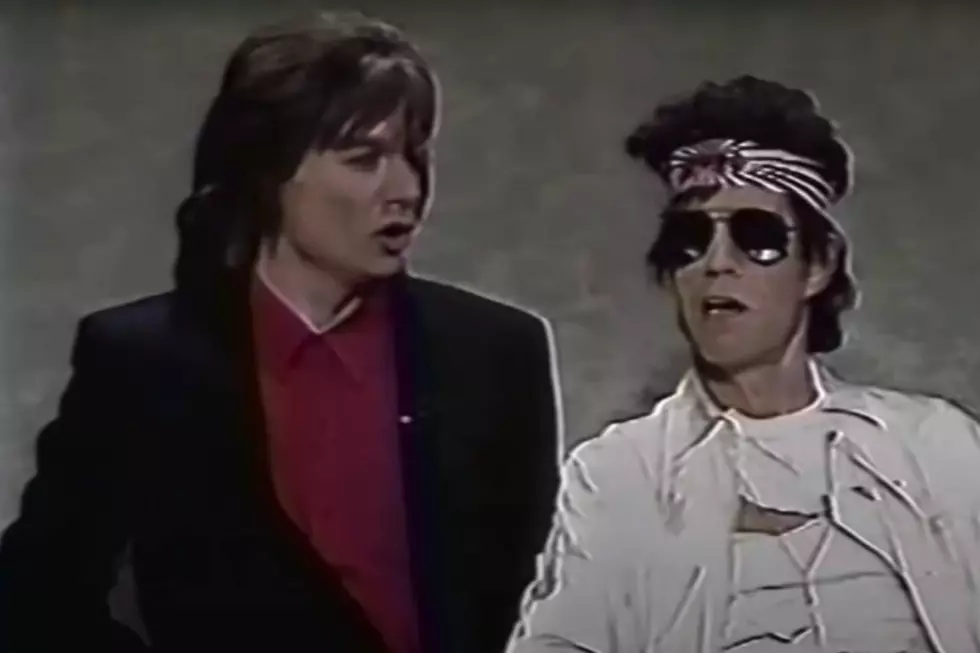
30 Years Ago: Mick Jagger Spoofs Keith Richards and Himself on SNL
The fact that Saturday Night Live producer Lorne Michaels has a lot of very famous friends can be a mixed blessing for the show. Certainly, a boon in the early days of a daring late-night comedy show struggling for recognition, Michaels' close friendship with superstars like Paul Simon granted ratings and legitimacy to a program that NBC executives openly doubted would make it through a full season.
The downside comes from Michaels’ over-reliance on his Rolodex of famous faces, as when the entire second episode of the show’s inaugural season essentially became a Paul Simon musical showcase, with Simon performing two solo numbers, reuniting with estranged musical collaborator Art Garfunkel for several more and relegating the still-neophyte cast members to walk-ons. In later years, certain F.O.L. (friends of Lorne) would pop by to take roles from always struggling-for-airtime cast members, disrupting SNL’s infamously fragile backstage ecosystem in pursuit of a guaranteed rating bump.
That would be more of a problem if most of Michaels' celebrity pals weren’t pretty funny in their own right, a trait exhibited gamely by Rolling Stones singer and longtime F.O.L. Mick Jagger on the Feb. 6, 1993, episode. Jagger’s association with SNL goes back a long way, with the Stones initially appearing as musical guests back in the show’s third season, a stint memorable for both Jagger’s role as himself alongside Dan Aykroyd’s peerlessly unhip Tom Snyder, and the Stones' surprisingly disappointing musical numbers, reportedly caused by the infamously hard-partying band’s attempt to out-party SNL’s resident wild man, John Belushi.
Jagger’s association with Michaels predates even that early appearance, however, with SNL filmmaker Tom Schiller revealing in the backstage history Live From New York, that he, then couch-hopping in preparation for the show’s debut season, would often find himself wishing Jagger would leave Michaels’ apartment so Schiller could finally go to sleep. Jagger would later show up at random intervals on the show, including a memorable 2012 hosting gig where he led Foo Fighters, Arcade Fire and the SNL band in singing a touching farewell to departing star Kristen Wiig, and another where he played opposite Jimmy Fallon’s exaggerated mirror Jagger in 2001.
But it was the 1993 Luke Perry-hosted SNL that Jagger truly proved his worth as a comic performer, as he took on the persona of a completely different Rolling Stones icon. After a "Weekend Update" intro where anchor Kevin Nealon introduced the topic of the censorship controversy swirling around the release of the song “Cop Killer” from Ice-T’s hardcore side project Body Count, Saturday Night Live brought back "Update"’s old point/counterpoint debate gimmick, only featuring Mike Myers as Jagger and Jagger himself as Rolling Stones guitarist Keith Richards.
Sporting a signature Richards headband, shades, cigarette and barely comprehensible mumble, Jagger is having a ball as his Richards counters the anti-censorship position of Myers’ preening Jagger with a series of law-and-order cliches, even resurrecting a variation of Aykroyd’s original rebuke to Jane Curtin, and barking, “Mick, you ignorant slut.” Indeed, considering Richards' long history of run-ins with the law (all centered on the guitar legend’s vocal use of illicit substances), Jagger’s Richards urging, “You gotta stand up for the cats in blue, man,” might be a bit jarring.
Watch Mick Jagger on 'Saturday Night Live'
But Jagger, slouching and murmuring in an approximation of his longtime frenemy’s raspy, loose-lipped and hazy accent, is relishing the chance to take the piss out of Richards — and himself. In deference to the real Richards’ long string of unpredictable live TV appearances, Jagger courts censorship himself by drawing out the letter “f” in Richards’ sneering, “If you didn’t have rules, you’d have ffffriggin’ anarchy.”
At one point plopping his boot up on the "Update" desk as Myers’ Mick goes off on a tangent about the dangers of censoring Ice-T (“What’s next, you won’t be able to write about killing security guards?”), Jagger’s Richards finally goes fully incomprehensible in his dismissive wrath. “All the time, all the time with yer liberal claptrap,” begins this Richards intelligibly enough, before what sounds something akin to, “and the burry, and yer treble clevin and yer track light and the [truly unintelligible.]” Myers Jagger speaks for the world when he responds to the triumphantly slouching Richards, “That wasn’t English, Keith. You know, you were talking in Esperanto or some language that twins teach each other.”
The real Jagger and Richards have ridden their perpetually fraught love-hate relationship to great artistic heights over the many decades, and these versions are no different. With Richards doubling down on his point with an utterance along the lines of, “Listen man, you gonna sillin’ go with the goin’ bean,” Myers’ Jagger perks his ears up, hearing a potential hit and crooning, “You gonn sillin’ go with the goin’ bean, man!” Richards crankily objects to Jagger’s ad-libbed “man,” but joins in, the pair happily harmonizing on Richards’ nonsense verse with an undeniably catchy tunefulness.
In the end, did a zonked-out Richards and a cocksure Jagger solve Saturday Night Live’s censorship debate? They did not. Instead, Myers and Jagger proved that having an ultra-famous F.O.L. at the ready isn’t always a bad thing for SNL. “Can we come back next week?” Jagger’s Richards asks Nealon, flicking his lit cigarette across the stage. Sadly, this would be the unlikely debaters’ only appearance.



